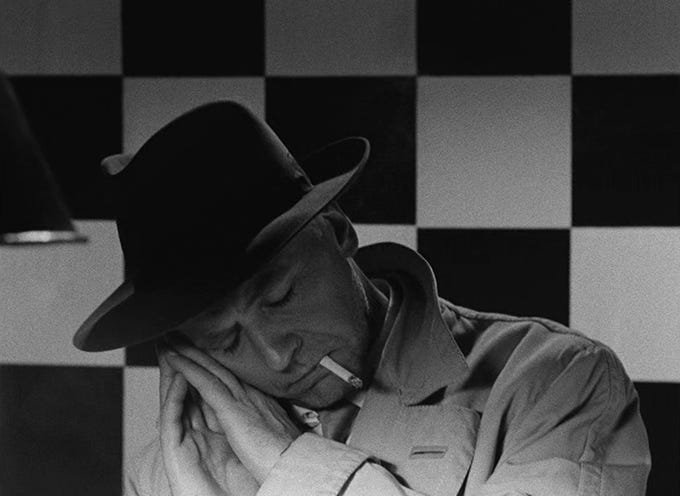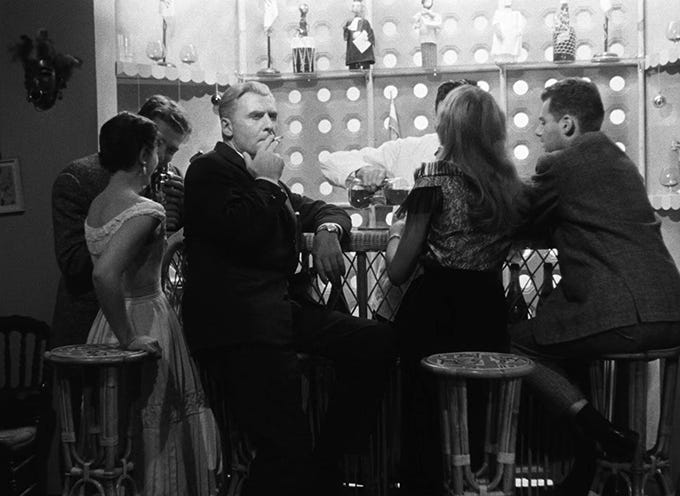Works of art, music, and cinema grab the participant's attention as if they are looking at themselves in a mirror or mirror image. Bob le Flambeur is such a film for me because it seems to be a cinematic dream I keep having of floating between darkened streets and off-putting locations with checkered floors and walls that couldn’t possibly exist, yet it does, in this Jean-Pierre Melville film, made in 1956. Roger Duchesne plays Bob, who had a fascinating past as both an actor and a participant in the Gestapo and who was accused of torturing at least one member of the French Resistance. Like Bob in the film, he was also a gambler, and the series of losses in the Gambling world got his attention from the Occupying forces in Vichy, France. After the liberation of France and an outcast of the film business, Duchesne participated in a robbery of a bank where he ran off with 800 million Francs. Bob won The exact amount in the Casino or theft in the film.
All works of art should reflect real life, as in looking in a mirror. Jean Cocteau's art, especially his films, has mirrors throughout, which are portal entrances to another world, but more likely, the landscape is very much that character. Even death is an illusion; it is a signpost on a journey. Jean-Pierre Melville worked with Cocteau on their Les Enfants terribles (1950) as director, and Cocteau wrote the screenplay (with some assistance from Melville) and the novel the film is based on. On the surface, it seems more of a Cocteau motif, and it is, but I think Melville was attracted to the idea of someone’s whole world contained in a few rooms.
I have always felt that containment is very much in the taste of the Dandy aesthetic. Melville had his film studio, Studios Jennier, which he could access all day and night. All his interior scenes were done in his studio, including police stations and various nightclubs/bars shown throughout his films. Even the entrance to the building is used for a nightclub entrance or a police station. An electrical fire burned down the studio, or something suspicious occurred to cause the fire. In the world of Melville, there is always enough room for paranoia. Having your studio is practical, but after seeing all his films and reading numerous interviews with Melville, I suspect he needs to make a cacoon to distance himself from certain aspects of the outside life. As for myself, lately, I have been attached to my home and am not comfortable being at a distance unless it is somewhere chic, like Manhattan, Paris, or Tokyo. Then I leave the house, but there are locations in the Los Angeles area (where I live) that I will never go to again, not out of fear but not being able to take the humdrum of such a location.
I’m not Bob le Flambeur, but I identify with his passion for keeping a schedule, such as his gambling hours in the middle of the darkness or early morning. Or his desire to be out of his apartment to wander through his landscape of numbers, currency, people-of-questionable morals, and the gangster/police existence. Bob is a moral figure and is very much in the style of Raymond Chandler’s Philip Marlowe, another knight among the lows. But again, Bob has his preference, which is Gambling, which can cause him to lose the big picture of something like a real-time robbery.
A schedule is a comfortable blanket, and this has been an issue in my life. I wake up in the morning (always at 6 am) knowing pretty much what my day will be like because I rarely take chances that can drag me away from writing. Writing, to me, is a combination of actual work on a page and reading. There are naps between those activities, but they are all planned so I can finish the work I have started and desperately want to finish by the end of the day. I don’t beat myself up if I fail my duties, but one thing I despise is being thrown off the schedule due to another issue coming up. It can be a homeowner issue or some minor emergency, but I wouldn't say I like anything stopping me from the sweat of one’s brow. And I’m compelled to do things such as work, but I don’t know why. I feel that I’m disappearing, and the only thing left is my writing. It’s egotistical, but it is also a feeling that I have spent much time here (almost 70 years) on Earth and want to show something for it. To who or for whom? I haven’t the foggiest idea.
The patterns in Bob le Flambeur appeals to my sense of duty, and I also like to stay in my neighborhood as much as possible. It seems Bob is attached to Pigelle or, if he has to, the Casino by the sea. I suspect there is no real difference between Bob le Flambeur and the actor Roger Duchesne. Like Bob, he gambles and gets in trouble with authority. He is even a bit of a Rat for working with the Vichy forces, and if true, the torture he caused is unforgivable. Yet, Melville sought him out for this role, and I think Duchesne’s odd duality of character fits him to this role like a tailored suit on a handsome man.
We have to accept duality in life. Every once in a while, in our cultural history, there are two sides: the right side and the wrong side. But often, the line between those two becomes fainter and almost non-existent. I may be one of the few in this country whose parents weren’t raised with a moralistic stance but trained to see people how they are, and then one reacts to that sensibility. Bob has a touch of moral stance when he refuses to help a fellow gangster who is a pimp. Because in Bob’s eyes, there is nothing lower in culture/society than a pimp. Bob is also a Dandy, and there is always a matter of taste when dealing with the landscape of various endeavors taking place. Bob is a hero; whether we see him as a movie-type hero or anti-hero, Bob remains a person who stands apart from his social pack. Melville likes the icons of Hollywood stardom and the byproducts of that world. Bob/Melville is a champion of surroundings that are truly surface, but once in a while, you have to dwell in a social setting that is rotten to the core. Being a dandy is a stance against nature, especially human nature, where violence comes from fear or aggression. There may or may not be a God, but Gambling is an activity where one believes that there is a higher understanding or a power that is connected to chance. Perhaps very close to the urge to make art as well. It’s all a dice throw and how it lands.





We all need a growlery! In an odd way our growlery equals freedom.
Nice piece, Tosh!